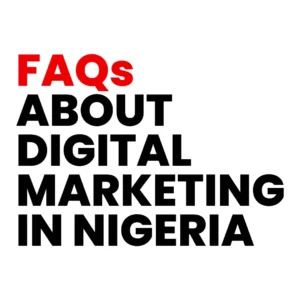SEO is not a complex mystery but a set of practical strategies that can significantly enhance your website’s performance. Understanding and implementing the various types of SEO can make your website load faster, be easier to find, and attract more visitors. This article is your guide to mastering the primary types of SEO that every website owner in Nigeria can easily implement.
You need to understand SEO if you have a website and want people in Nigeria and across the world to be able to locate it quickly. SEO raises your website’s position in Google and other search engine results. When your website ranks highly, more people will visit it, which is fantastic for business or any other goal you may have. For instance, a local business in Lagos that implemented effective SEO strategies significantly increased website traffic and customer engagement.
1. On-page SEO
The main aim of on-page SEO is to optimize your website’s content for both search engines and users. This includes enhancing the visual elements of your website to attract search engines like Google. Doing this increases the chances of your website appearing at the top of search results, leading to a significant boost in website traffic. Whether you run a blog, a business, or any other website, mastering on-page SEO is crucial to achieving your goals in Nigeria.
6 key elements of on-page SEO
Concentrating on-page SEO can increase your website’s appeal to search engines and users. Whether you want to expand your business, share your passions, or build online relationships, this will help you acquire more traffic and accomplish your objectives. Below are six essential elements you should consider when working on on-page SEO;
1. Keyword research and optimisation
Keywords are the words and phrases users type into search engines while looking for information. You must ascertain which terms are popular and pertinent to your website before conducting keyword research. As soon as you have these keywords, you should use them in your writing to aid with site navigation.
2. Content quality
Your content must be pertinent, helpful, and engaging for your target audience. If you have high-quality content, visitors will stay on your website longer and be more likely to return. Make sure your writing clarifies issues and adds value for your audience.
3. Optimisation of meta tags
Meta tags are brief text segments that provide an overview of the information on your site. The title tag and the meta description are the two most crucial meta tags. These tags, frequently displayed in search results, aid search engines in determining your page’s topic.

4. URL structure
The web address of a page on your website is its URL. A good URL is easy to read, concise, and contains keywords. A URL such as “www.yoursite.com/best-nigerian-food” is preferable to “www.yoursite.com/page123,” for instance.
5. Internal link
Links that lead from one page on your website to another are called internal links. These links facilitate the discovery of additional information by site users and deciphering your website’s structure by search engines. When guiding visitors, make sure your connections are evident and pertinent.
6. Mobile friendliness and page speed
Your website should be mobile-friendly and load rapidly. Nigerians often use their phones for internet browsing; thus, your website must function well on small screens. Pages that load quickly increase user satisfaction and decrease the likelihood that they will leave your site soon.

2. Off-page SEO
The activities you take outside your website to improve its search engine ranking are called off-page SEO. Off-Page SEO includes activities you do on other websites and platforms, whereas On-Page SEO concentrates on the content and layout of your website. This is significant because search engines assess user and site traffic to determine how popular and reliable your website is. An off-page solid search engine optimisation strategy can increase website traffic, which is very helpful for Nigerians looking to expand their audience.
5 vital elements of Off-page SEO
Concentrating on Off-Page SEO may establish a solid online reputation for your website and draw in more traffic from various sources. Increasing your audience through this will benefit any website promotion, whether business, blog, or otherwise. Here are five elements of off-page SEO you need to look into to get the best for your website.
1. Quality link-building
Backlinks are connections to your website made by other websites. Links to your content from reliable, high-quality websites indicate how helpful your website is to search engines. Aim for links from trustworthy websites that are relevant to your content.
2. Engagement on social media
An active presence on social media sites such as Facebook, Instagram, and Twitter encourages more people to view and share your content. Increasing website traffic and search engine rankings can be achieved by interacting with your audience through comments, likes, and shares.
3. Online reputation management
It matters what people think of you online. Good remarks and evaluations regarding your website across various channels can increase your trustworthiness. You may influence how others view your website by managing your internet presence and answering reviews.
4. Guest blogging and outreach
Reaching out to influencers and writing articles for other websites as a guest blogger can help you expand your following. Influencers’ followers may visit your content if they mention it or provide a link to it.
5. Local SEO
Ensure your website shows up in local search results if you own a local business. This involves listing in local directories and establishing a Google My Business presence. This makes it easier for locals to find you.
3. Technical SEO
Ensuring that search engines properly position and interpret your website is known as technical SEO. It’s all about the technical aspects that make your website function better and higher in search results. When you optimise the technical features of your website, search engines such as Google can more effectively crawl, index, and rank it, increasing the number of users who can find it.
5 key factors of technical SEO
You can ensure that your website functions correctly and gets seen by search engines by concentrating on technical SEO. Whether you are managing an e-commerce site, a news website, or any other kind of website, this will assist you in drawing in more traffic and accomplishing your objectives. Below are five factors you need to consider for proper technical SEO for your website;
1. Crawlability and website architecture
This entails structuring your website so that search engines can easily navigate it. An organised website makes it easier for search engines to identify every page and comprehend how they relate to one another. Make sure the organisation of your website is sensible and straightforward.
2. Schema markup
You can use a code called schema markup on your website to improve how search engines interpret the content. It can inform search engines about the content of your page, including whether it is an article, a product, or a recipe. This can improve your website’s appearance in rich snippets and other unique search features.
3. Optimisation of XML sitemap
A file that enumerates every page on your website is called an XML sitemap. It facilitates search engines’ more effective page discovery and indexing. Ensure that your sitemap is current and contains links to all of the key pages on your website.
4. Security measures and HTTPS
A secure variant of the HTTP protocol called HTTPS is used to transfer data between a website and a web browser. Your website is more secure for users and ranks higher in search results if it has HTTPS. To safeguard both your website and its visitors, always utilise HTTPS.
5. Speed at which pages load
The speed at which your website loads is crucial. Visitors may leave your pages before they have a chance to view your content if they take too long to load. Utilise tools to assess the speed of your website and implement fixes, such as picture compression and the use of faster servers.
4. Local SEO
Local SEO ensures customers in your neighbourhood can find your business online. It facilitates your company’s visibility in local search results for customers looking for your goods or services. This is particularly crucial in Nigeria, where many people look up local companies on their phones. Local SEO can help more locals find you whether you own a restaurant, store, or other local business.
4 critical components of local SEO
Increase your company’s visibility to local customers by concentrating on local SEO. This can assist you in expanding your clientele and growing your company, regardless of whether you are a Nigerian local service provider such as a restaurant or salon. Here are 4 key components of local SEO you should consider for your website.
1. Google My Business optimisation
The free Google My Business (GMB) tool lets you control your company’s appearance on Google Maps and Search. Ensure that your business name, address, phone number, and hours are all included on your GMB page. To draw in more visitors, update it frequently and include photos.

2. Targeting local keywords
Make use of keywords that contain where you are. For instance, use “best bakery in Lagos” instead of “best bakery.” This makes it easier for locals to find your company when they search online.
3. NAP (Name, Address, Phone Number) consistency
All internet listings for your company should have the same name, address, and phone number. Maintaining consistency in your business information helps search engines trust it and gives you a higher ranking in local searches.
3. Online reviews and ratings
Urge your clients to submit online reviews. Good ratings can help you draw in more business and improve your reputation. React to positive or negative reviews to demonstrate your interest in your client’s experiences.
4. Building local links
Obtain links to your website from other nearby websites. This may come from business directories, blogs, or local news websites. These local links raise your website’s search engine ranks and increase local visitors.
9 other types of SEO options for your website
Apart from on-page, off-page, technical, and local SEO, other types of SEO can enhance the visibility of your website and draw in more people. Whatever kind of website you have, you may increase its visibility and draw in more people by learning and utilising these many types of SEO. With these SEO tactics, you can connect with people in Nigeria and other countries by posting content on social media, making videos, or operating an online business. Let’s examine these nine additional types of SEO and their potential advantages.
E-commerce SEO
E-commerce SEO helps attract more clients to your online store by improving your products’ visibility on search engines. This entails improving your website’s navigation, optimising product pages, and utilising keywords that customers look for. If you offer clothing, for instance, you should use keywords like “buy dresses in Nigeria” to draw customers.
Video SEO
Optimising your videos to show up in search results is known as video SEO. This entails utilising the appropriate keywords in your videos’ tags, descriptions, and titles. You may use keywords like “how to cook jollof rice” if you make cooking videos. This makes it easier for viewers to find your videos while looking for cooking advice.
Image SEO
With image SEO, your photos will appear in image search results. This entails giving your photographs alt text and descriptive filenames. Use the filename “Nigerian-jollof-rice.jpg” and the alt text “Nigerian jollof rice with chicken” if you upload a photo of Nigerian cuisine, for instance.
International SEO
Websites that aim to reach viewers beyond international borders should use international SEO. This entails localising your content to fit the culture of your audience and utilising several languages. For instance, if you want to target users in Ghana and Nigeria, you may have versions of your website in Twi and English and utilise keywords that are particular to each country.
Voice SEO
Voice SEO makes your website more visible in search results as more people use voice assistants like Siri and Google Assistant. Conversational keywords and natural language are used in this. For instance, say, “What’s the best restaurant in Lagos?” rather than just “best restaurant.” This aids in your website’s ability to respond to queries from users’ devices.
YouTube SEO
The goal of YouTube SEO is to raise your videos’ ranking on the platform. This entails adding pertinent keywords to your videos’ tags, descriptions, and titles. Use keywords like “travel guide to Abuja” if you create trip vlogs. This increases the number of views and subscribers to your videos.
Social SEO
Using social media to increase the visibility of your website in search results is known as social SEO. To increase traffic to your website, this entails sharing your content on social media sites like Facebook, Twitter, and Instagram. You may improve your search engine rankings by interacting with your audience and encouraging them to share your content.
Content SEO
Content SEO is the process of producing relevant, high-quality content that draws users in and raises your website’s search engine ranking. Writing blog entries, articles, and other content incorporating the appropriate keywords falls under this category. For instance, if they are about Nigerian fashion, publish articles about the “latest fashion trends in Nigeria” on your site.
Mobile SEO
Thanks to mobile SEO, your site will function properly on mobile devices. This is significant since many Nigerians access the internet via their phones. To ensure your website is mobile-friendly, use a responsive design, which modifies the layout to fit any screen size. Easy navigation and quick loading times are also essential.
Conclusion
Learning and using many types of SEO may significantly improve your site’s exposure and performance. These tactics will assist you in connecting with and engaging your target audience, regardless of the kind of website you manage in Nigeria—a blog, an e-commerce site, a local business, etc.
As an SEO specialist in Lagos, I can help you with a customised strategy that addresses your unique needs. Chat with me if you’re ready to increase website traffic and achieve more success online.




